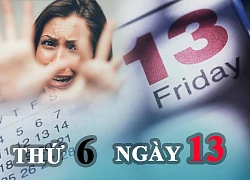Antifans who are waiting for ViruSs's drama may have a psychological syndrome (FOMO).

3 | 0 Discuss | Share
Once again, the phrase "Friday the 13th" has become the center of heated discussion on social media platforms. A series of posts and comments have appeared, clearly showing two opposing viewpoints.
Accordingly, one side believes that this is a day of bad luck, while the other side asserts that this is just a normal day like any other day, luck or bad luck depends entirely on each person's thoughts and actions.
So, what is the truth behind “Friday the 13th� How many of these days are there in a year, and why does it become such a nightmare for some, while others consider it lucky?
Frequency of occurrence of "Friday the 13th" and psychological syndrome
According to calendar experts, the number of Fridays the 13th in a year is not fixed. It can appear from one to three times. Specifically, if you look back at the calendar, you can see that in 2024, there are 2 Fridays the 13th falling on September 13 and December 13. But this year 2025, there is only one Friday the 13th, which is today, June 13.
Notably, the upcoming year 2026 will have 3 Friday the 13ths, falling in February, March and November. Notably, 2026 is also recorded as the year with the most Friday the 13ths in a decade. This fluctuation in frequency makes this day even more mysterious and attracts attention every time it comes.
The specific fear of Friday the 13th is even recognized as a psychological syndrome with a complex name: paraskavedekatriaphobia or friggatriskaidekaphobia. This is similar to the fear of the number 4 in East Asian countries such as China, Japan and Korea, which is called tetraphobia (due to the pronunciation of the number 4 being similar to the Chinese word for "death").
Some people with this disorder are so afraid that they can't even mention "Friday the 13th." Others avoid major activities like flying, going to work, or even getting out of bed on this day. Studies show that symptoms of this phobia range from mild anxiety and restlessness to severe panic attacks that significantly impact daily life.
The name of the disorder comes from Frigg – the Norse goddess after whom Friday is named – and triskaidekaphobia, which is Greek for fear of the number 13. It is also called paraskevidekatriaphobia, which comes from paraskevi, the Greek word for Friday, suggesting that the fear has deep cultural and linguistic roots.
The Origins of Fear: From the Bible to Norse Mythology
The notion of Friday and the number 13 as unlucky has existed in many Western cultures for centuries, with many stories and legends claiming to be its origins.
Some believe that the concept may be related to biblical stories. The most famous example is Judas Iscariot, one of the 12 apostles of Jesus and also the one who betrayed him, who was called the "13th guest" at the "Last Supper" - the last meal Jesus had with his disciples before his execution. Judas' presence was associated with betrayal and death, thereby instilling in the subconscious the bad luck of the number 13 when it accompanies an important event.
Superstitions surrounding Friday the 13th may also be linked to Norse mythology. According to one popular legend, the 12 gods were having a feast in Valhalla (the Norse heaven) when Loki, the demigod of chaos, made an uninvited appearance.
Loki's arrival brought the total number of guests to 13. The chaos Loki caused led to the departure of Balder, one of the most kind and beloved gods. Balder's departure caused deep grief among all the gods, and from then on, the number 13 was associated with bad luck and misfortune.
Other theories also link Friday the 13th to unlucky historical events, such as the arrest and mass execution of the Knights Templar on Friday, October 13, 1307, by order of King Philip IV of France. These events, although perhaps embellished or exaggerated over time, have contributed to the folklore belief in the unluckiness of the day.
Friday the 13th's Conception in Different Countries: Lucky or Unlucky?
Interestingly, while some countries believe Friday the 13th to be an unlucky day, in other cultures it is considered extremely lucky, or at least has no negative connotations. This shows that the notion of good and bad luck is often relative and depends on cultural context.
In Brazil, a Friday the 13th that falls in August is considered more unlucky than any other Friday the 13th. This is especially true because the word agosto (August) rhymes with desgosto (sadness) in Portuguese, creating a negative association in sound and meaning.
In contrast, in many Spanish-speaking countries and some Latin cultures, Friday the 13th is considered lucky. This belief sometimes stems from the fact that they do not consider the number 13 to be unlucky like Anglo-Saxon cultures, or because they have their own traditions in which the number 13 has positive connotations.
It is even believed that Friday the 13th is a particularly lucky day for babies to be born. As evidence of this, there have been many stories of people winning millions of dollars on Friday the 13th, further reinforcing the belief in the luck of this day in some communities.
In ancient Egypt, the number 13 was also considered a lucky number. They believed that the 13th stage of life was associated with the afterlife, a world of rebirth and eternity. After the decline of ancient Egyptian civilization, the number 13 remained associated with the end of earthly life.
However, its connotations shifted from hope and rebirth to death and fear in later cultures, reflecting a change in conception over time and the spread of other legends.
Why Friday the 13th is called "Unlucky Day"  team youtuber10:00:03 10/08/2020Friday the 13th in Western opinion is an extremely unlucky and unlucky day. A lot of people have to avoid it because there have been many unhappy things happening on this day that make them scared and scared. According to the concept of Western culture, Friday the 13th is a day that brings...
team youtuber10:00:03 10/08/2020Friday the 13th in Western opinion is an extremely unlucky and unlucky day. A lot of people have to avoid it because there have been many unhappy things happening on this day that make them scared and scared. According to the concept of Western culture, Friday the 13th is a day that brings...

3 | 0 Discuss | Share

3 | 0 Discuss | Share

1 | 1 Discuss | Share



3 | 0 Discuss | Report